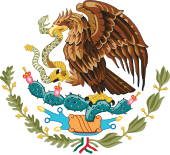
Back قانون الجنسية المكسيكية Arabic Nacionalitat mexicana Catalan Mexikanische Staatsangehörigkeit German Nacionalidad mexicana Spanish قانون تابعیت مکزیک Persian Meksikon kansalaisuus Finnish
| Nationality Law Ley de Nacionalidad | |
|---|---|
 | |
| Congress of the Union | |
| Citation | L.N., vigente desde 1998 |
| Territorial extent | Mexico |
| Enacted by | LVII Legislature |
| Signed by | President of Mexico |
| Signed | December 12, 1997 |
| Commenced | March 20, 1998 |
| Administered by | Secretariat of Foreign Affairs |
| Status: Amended | |
Nationality in Mexico is defined by multiple laws, including the 30th article of the Constitution of Mexico and other laws. The Constitution's 32nd article specifies the rights granted by Mexican legislation to Mexicans who also possess dual nationality. This article was written to establish the norms in this subject in order to avoid conflicts which may arise in the case of dual nationality. This law was last modified in 2021.
In general terms, Mexican nationality is based on both the principle of jus soli and the principle of jus sanguinis. The Mexican constitution also makes a distinction between nationals of Mexico and citizens of Mexico. The legal means to acquire nationality and formal membership in a nation differ from the relationship of rights and obligations between a national and the nation, known as citizenship.[1][2][3]
- ^ Boll 2007, p. 66-67.
- ^ Honohan & Rougier 2018, p. 338.
- ^ Guerry & Rundell 2016, p. 73.